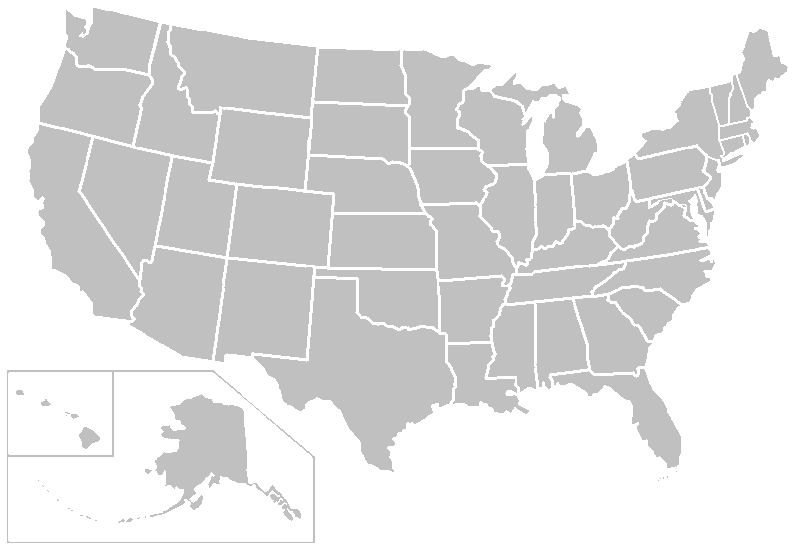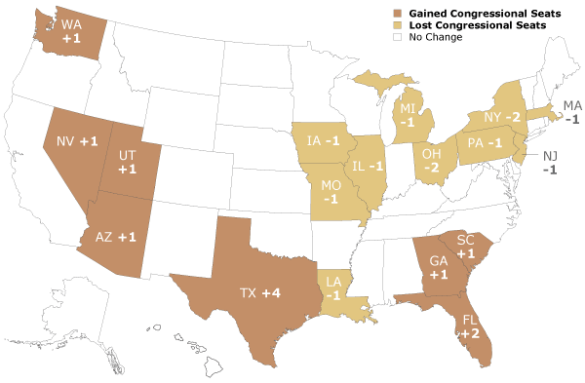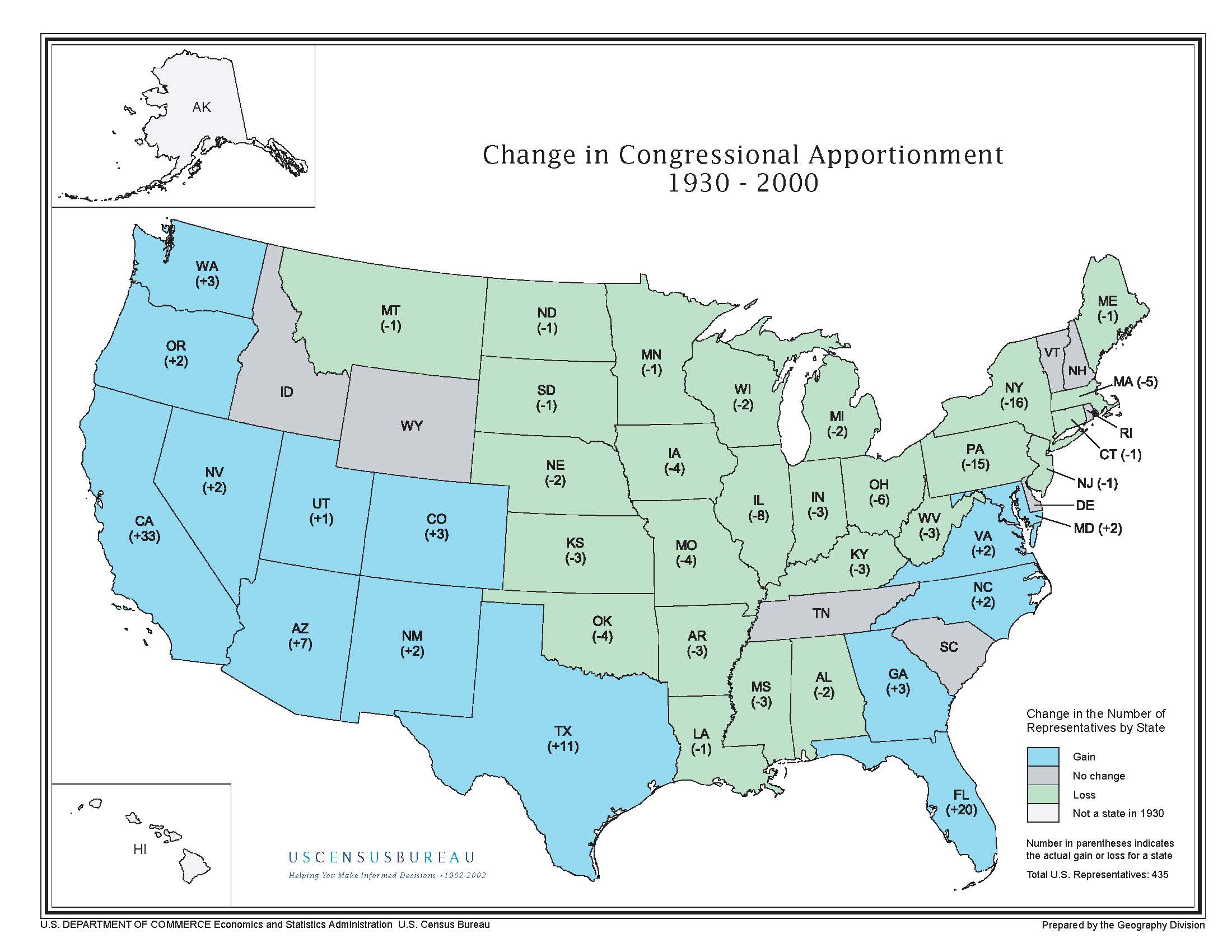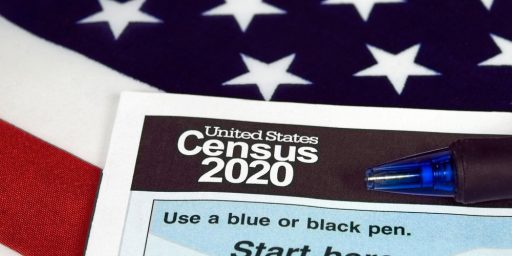Are “Liberal” States Shrinking?
Thinking about unsupported narratives and a little bit about data usage.

I noticed an editorial in the Washington Examiner, Is it any wonder liberal states are shrinking? that has inspired me to comment because it hits on a pet peeve of mine (a narrative about California and of state population trends in general) and mostly because it just represents a sloppy job of “analysis.”
The narrative about California is that it is just such a horrible place that people are fleeing droves. It is a staple in right-wing media, wherein places like San Francisco are described as hellscapes of human feces and used needles to the point that no one wants to live there (which is, of course, why real estate is so high there).
It is true that I lived in California for about six years in my youth, finishing high school, and graduating with my BA from the University of California, Irvine. I had my first date with my wife 35 years ago last week and made several lifelong friendships during that period. I will also say that California is an absolutely gorgeous place (and SF is no hellscape, quite the contrary, at least not when I visited about 5 years ago).
However, my CA-related pet peeve has nothing to do with any nostalgia or allegiance. Truth be told, I have no interest in living there again, largely because it is too crowded and expensive. I agree that housing policies in CA, especially in places like the Bay Area have lead to unnecessary housing shortages. I concur that the property tax structure under Proposition 13 created any number of distortions to the system (ironically, a conservative anti-tax policy). I understand why people would find it too expensive to live there and flee eastward (and why companies might decide that business operations would be cheaper elsewhere).
No, my annoyance at cries that California is a hellhole and that people are fleeing in droves is driven by my desire to have people talk about facts and reality, as well as because if people are going to cite data points that they should do so competently. And, facts should trump ideology, not the other way around (tilting at windmills, I know).
Let’s face facts: the editorial linked above, and most conversations about people leaving “liberal” states is really about a simplistic ideological game wherein it is pretended that points can be scored to states based on inflow and outflow of persons and that said flows are a direct commentary on prevailing policy in those states (especially taxes).
For an entire human lifetime, the state of Illinois has been a laggard in population growth. It has lost eight congressional districts since the 1950s. But new census estimates released last week show that this decade, something very special has happened.
The state, affectionately referred to by many as either the “Deadbeat State” (for its practice of handing out IOUs in place of payments to vendors) or “Madiganstan” (after the powerful speaker-for-life of its state House), has actually been losing population every year since 2013.
In fact, the land of Lincoln has lost a net 308,000 residents over the last seven years and a quarter million since the last decennial census. Both numbers are larger than the population of any city in Illinois except for the megalopolis of Chicago. And Illinois’s rapid shrinkage is occurring even as the United States grew by nearly 7% since the last census.
Illinois’s state government is extraordinarily left-wing, and its taxes are extraordinarily high. Its Supreme Court stubbornly stands athwart desperately needed pension reforms, without which the state’s finances simply cannot be saved. Opportunity there is dying under the weight of corruption and the stranglehold of special interests such as labor unions.
Illinois is not alone. The same census data point to two other big states that are also driving away residents with similarly impractical, ideologically leftist policies — California and New York.
Look, I am not going to pretend to know why Illinois shrank. It may well be because of tax policy, although odds are quite good that there are other factors.
Nonetheless, sweeping conclusions are drawn:
Even as these states empty out, the same census numbers show that people are gravitating toward states that have low or no income tax. Not all of these are conservative states either — Washington state and Colorado are among the fastest growers, along with Utah, Texas, Idaho, Arizona, Florida, North Dakota, and South Carolina. But in all these cases, those in power have remained practical. Rather than treating their job-creating businesses as golden geese ready to be slain, they have guaranteed a friendly, nonideological business climate and mostly stayed out of the way of individual success.
If you want your state to succeed, that’s the formula. It isn’t hard to understand why.
Well, since the has been a decades-long trend of US population shifting from the northeast/north to the south and west, the notion that Illinois and New York would have peaked in population and places likes AZ, FL, SC, and TX have grown is no surprise: it fits a known trend. We also know that North Dakota (the main geographical outlier) has grown of late due to fracking (as has South Dakota).
If you are going to write about such things, you kind of need to acknowledge this kind of thing.
Note this projected map of House reapportionment (via PBS):

And then note the shift that took place after the 2010 Census:

And after 2000:

What could the trend be?
I could go on by decade, but here’s a map that shows the shifts from 1930 to 2000:

The prevailing trend is rather obviously south and west from the north and east. I would note too, in terms of the Washington Examiner’s simplistic thesis, low-tax states like Alabama, Arkansas, Louisiana, and Mississippi have not done as well as their notion should have predicted.
Indeed, it makes me think of an ongoing local problem in Alabama’s capital: If the quality of area’s schools doesn’t improve, could Maxwell AFB take off?
Military, education, city, county and business leaders gathered in front of the Maxwell Air Force Base main gate Wednesday to stress the importance the base has to Montgomery’s success, and how dependent its future is on the Montgomery Public School system.
There is a connection between military readiness and quality education opportunities around a base, said Gen. Trent Edwards, a former 42nd Air Base Wing Commander at Maxwell.
If the Montgomery County school system does not improve, the missions of Maxwell and Gunter could be reduced or relocated, he said. That potential loss would strip nearly 13,000 jobs attached to the base, as well as its the $2.6 billion annual economic impact — the largest of any industry in the River Region.
Indeed, infrastructure and other factors that require public expenditure have a direct influence on the ability of localities to attract business investment (and, therefore, in-migration). Low taxes alone are not enough to induce investment and in-migration.
For that matter, Kansas engaged in a massive supply-side experiment starting in 2012, and its population has been largely flat since then.
Also, a little basic math is in order.
The editorial notes that Illinois’ population shrank by 308,000 over the last seven years. On the one hand, a lot of people. On the other, some quick googling and calculations suggest that the state has gone from roughly 12.9 million to about 12.6 million since 2013, for a loss of ~2.4%. That is hardly the emptying of the state.
In regards to New York, the piece asserts “New York…has also lost about 42,000 residents in the last decade. Its population peaked in 2015, and in the time since, it has lost about 320,000.”
This amount to, again using numbers from the US Census Bureau via Google, to a -0.66% loss in the state from 2010 to 2020. That is shrinkage I don’t think even George Costanza would notice and, again, is not anywhere near an emptying. (FWIW, NY’s population growth rate has been fairly flat since 1960).
Back to California for a second, here’s the population growth chart for the state from the Public Policy Institute of California:

California has been known for the high cost of living and for doing business for decades. I recall this complaint back when I lived there in the late 80s/very early 90s. I also recall conservative commentators at the time claiming the state would soon lose business in droves to other states. And while some did move to those states due to cost reasons, many did not. Indeed, the trend line kind of kills the notion that the state is emptying out.
As the write-up that goes along with the graph notes
One out of every eight US residents lives in California.
With almost 40 million people (according to 2019 estimates), California is the nation’s most populous state—its population is much larger than that of second-place Texas (29 million) and third-place Florida (21 million). California’s population is projected to reach 45 million people by 2050.
But the piece does note:
…but growth has slowed in recent decades.
Over the past 20 years, California has experienced its slowest rates of growth ever recorded, and growth has been especially slow since 2017. According to estimates by the California Department of Finance, California’s population grew by 7.3% (or 2.7 million) from 2010 to the end of 2019; this rate is only slightly higher than the national rate of 6.3%. International migration to California has remained strong, with a net inflow of 1.5 million. But net domestic migration has been negative: about 900,000 more people left California for other states than came to California from other states. Natural increase—the difference between births and deaths—added 2.2 million residents. But birth rates are at record lows and the number of deaths is increasing as the population ages.
Was this a bit of overkill to respond to, of all things, a Washington Examiner editorial? Of course, but it is actually something I have been meaning to write for a while, as there is a constant attempt to make simplistic claims about population growth patterns and tax policy. I also find it galling that people with big platforms make ridiculous claims like states are “empty[ing] out” without giving any time to looking at long-term trends, or the relative size of the changes.
All of this is knowable via some basic social science, consultation of basic demographic data, and a little math.
(If I ever decide to go anonymous, I think I should pick the nom de plume of “Sisyphus”).



Nice article. If there’s still a thing like “letter to the editor”, this would be a good candidate so it might be seen by the readers. It is the Examiner, though.
I’m so tired of bias-driven, rather than truth-driven, media.
When I look at those maps I see: weather.
People have moved from cold, dark places, to warm, sunny places. An amazing bit of technology has played a big part. It’s called air conditioning.
Las Vegas gets hotter than the surface of the sun. They’d have a population of dozens without AC.
As for California, as you point out it’s one of those, ‘the food is terrible, and the portions are too small!’ things. The house I bought two years ago has (according to Zillow) appreciated by about 12%. You know, because I live in such an awful place.
Unless global warming degrades the California weather, California will always do just fine.
Good post. Two thoughts:
1) There is a technological-determinist rationale that can explain the trend without reference to ideology: the shift of population to the South and West happened at the same time as the wide availability of air conditioning. Correlation is not necessarily causation, of course, but in this case it seems at least suggestive. People lived in the North and East before A/C because Northern winters were considered more tolerable than Southern/Western summers. A/C flipped that calculation on its head.
2) Another ding on the ideological explanation is that many Southern and Western states that have been on the receiving end of this population growth have become less conservative as they have grown. Virginia is practically a blue state now, which would have seemed crazy as recently as 1990; North Carolina, Georgia, and even Texas are trending the same way. If what is attracting people to these states is their rock-ribbed conservatism, they do seem confusingly eager to abandon it once they get there.
And, BTW, as for Texas. Where exactly in Texas are people moving to? Is it Waco? Is it Fort Worth? Is it Muleshoe?
Or is it mostly to the two big blue dots, Austin and Houston? Californians aren’t relocating to Texas, we’re colonizing it.
Rags such as the Examiner and trash think tanks like the Heritage foundation all have one thing in common: their writers know their job is to put shinola on the sh*t economics favored by their patrons. You do valiant work in pointing out their errors, but I hope you hold no illusions that they will actually respond to any correctives.
Another thing – when people point to the declining population of cities, they make no attempt to account for changing demographics. For the most part, big cities are pretty close to 100% developed. Building new single standing houses means tearing an old one down, so the number of such houses stays roughly the same. And the trend in large rental complexes is more square footage per household, both in the units themselves as well as the amenities expected (parking, fitness rooms, nice lobbies, etc). On top of this is the fact that the household size is shrinking as people have fewer children and wait longer to have the ones they do. In fact, they are waiting longer to couple up. All of these factors would decrease the population of a city without reducing the number of households, and sure enough, a chart I saw for Baltimore shows a steady number of households coupled with a decreasing population.
@Michael Reynolds:
Yup. (And double-yup on a/c given that my folks and two siblings live near Tucson).
Indeed. It always makes me think of Yogi Beara: “No one goes there anymore. It is too crowded!”
Lots of Austin influx, even when I was there in the 90s. And to DFW, Houston and so forth.
@Jason Lefkowitz: Indeed all around.
My oldest daughter is a -1 to California and +1 to Texas – in Houston. Her friends there insist that Texas is going to turn blue. So, that might be due to “colonization” by Californians.
I really like that you name checked Prop 13, which has to be one of the worst tax policies imaginable, and it’s strange that it would pass muster as “conservative” since its anything but equitable. And it’s extremely favorable to business – entrenched businesses. We are fiscalizing land use. And that last sentence is one that should be spoken by conservatives.
I am gratified that a prop on the ballot to reform it by excluding business property over 3 million failed by only a small margin (51.5% or so). It’s policy that is bad from both a conservative and liberal perspective. It’s an illustration how little the knee-jerk characterizations of California apply.
By the way, I grew up in WA, and bashing Californians was a regular sport then and there as well. But it was usually fueled by anti-growth sentiment. “It’s too crowded down there, of course they will want to move here, but the rain will keep them away!”, was how we thought of it and phrased it. WA grew anyway, because of Microsoft, etc., but the rain has certainly kept some Californians away.
@Michael Reynolds:
Not in the shade 😉
One time I had to schedule my vacation there later than usual. I wound up going the last week of May and the first few days of June. The last day it was 41 C. Wow. That’s really hot. I ventured out, then gave up and retreated to the casino floor of The D, for a long session of nickel Deuces Wild video poker.
But there was a distinct difference being out in the sunlight and taking shelter under shade. Under the Viva Vision canopy Downtown it was almost tolerable.
Anyway, back sort of on topic, I’ve two friends who moved from SF and LA respectively to Vegas. One spent some time dealing black jack, then found work as an insurance claims adjuster. Both moved because the cost of living in Vegas was lower. But it was not as though they were merely scraping by in CA.
Nevada, BTW, has no state income tax, and it is a “right to work” state. But the state’s biggest business, the casino resorts, employ many unionized workers.
I was born in Los Angeles. I split time growing up between Los Angeles and New York City. I am the definition of a “city boy.“ But I have lived and worked in rural Georgia, rural North Carolina, and rural Texas.
If Georgia isn’t already blue it will be by 2024, mostly due to how quickly Atlanta continues to grow from West Coast transplants in the film and television business. North Carolina will soon turn blue film time because it has the same basic demographics of Virginia. Young, affluent, and liberal, are flocking to the tech triangle. NC is about where Virginia was in 2012.
Lastly every big city in Texas is trending blue. Every single one. It’s just a matter of time before the populations in the big cities overwhelming the rural parts of Texas.
Unless the GOP changes significantly they will be in national minority party by 2028. I will still be able to win governor ships and legislative districts, but nationally they won’t stand a chance.
@Michael Reynolds: @Jason Lefkowitz: My immediate thought as well when reading the Washington Examiner’s comments was “air conditioning didn’t become prevalent until when?”
Although it does seem silly to retire to somewhere in the South and then spend all your time indoors bitching about the heat. (My view is simple: based on my electric bill, heating is cheaper than cooling, especially if you don’t mind bundling up in half-gloves and a quilt around you. Hence I’ll hang around somewhere in the north thankyouverymuch.)
@Kathy:
We thought of moving to Vegas, because we like all the creepy, phony, desperate weirdness. Also: taxes and cheap real estate. Here’s how you get past that idea: rent a car. Park it in the sun and go into a mall for an hour. Return to car. Climb into pizza oven and think, “Oh, right, that’s why I pay California taxes.”
And I have deep sense memories of Portland, Maine, Minneapolis and Chicago. Contact with air should not cause actual, physical pain. Getting accidentally locked out of your house should not be a death sentence.
Up here in Cow Hampshire, the population has been pretty static. Births barely outstrip deaths, seemingly, for anyone who moves in, one youthful native moves out. On the face of it, for conservatives, NH should be nirvana, small state government, business friendly, except for the seacoast, housing costs are moderate, etc, etc. Yes, electricity rates are high, but I believe that it’s the weather that keeps folks from moving here.
Oh and the southwest, the day people step into the shower and turn the tap and it only drips, that’ll end the romance with the SW regardless of AC.
@Michael Reynolds:
That’s why these arguments about “liberal states” are so bad: Louisiana, Mississippi and Alabama should be gaining Congressional Representation, not losing it, even if we consider problems like hurricanes. They have warm climates with coastlines, that’s supposed to attract population.
@Michael Reynolds:
Yeah, I’ve never done that in Vegas.
Bus service on the Strip and on to Downtown is amazingly good. Sure, I miss out places in Summerlin and the Boulder Strip, to name two areas, but I don’t have to worry about parking or how much I drink.
On my one trip to Vegas (for a writers’ conference at which I was scheduled to speak), what I noticed was that everything was “fabulous.” Even the damn pharmacy on the strip was “the fabulous pharmacy.” It said so on the sign. The museum with dinosaur models was “fabulous.”
I didn’t have a fabulous time.
@Jay L Gischer: Since the early 90s, I’ve been of the opinion that conservative economic policy not only favors capital, but also recognizes that business=/= capital quite clearly. I suspect that’s where Prop 13’s lean toward “entrenched business” comes into play.
Alas, winning governorships and legislative districts is enough for the GOP to hold position as the party of obstruction. My advice would be to keep reminding yourselves that conservatives don’t care about governing, they care about preventing you from doing it. That concept may serve you better in the long run than exulting in “they’ll never elect another President.” But do what you want; you have the power. After all “nationally, they don’t stand a chance.”
@CSK:
Well, not everything.
But it’s because of the sign down at the south end of the Strip, which reads “Welcome to Fabulous Las Vegas, Nevada.” There’s another sign further north welcoming people to “Fabulous Downtown Vegas.”
BTW, what people think of as “Vegas,” the Strip with the fancy resorts like Paris, The Mirage, Bellagio, Caesars, etc. is not in Las Vegas. It’s in an unincorporated part of Clark County. The only such large casino resort in Vegas is the Stratosphere. Further north there’s Downtown, where I prefer to stay (better gaming odds), and which is in Las Vegas.
I don’t know if I would call any of it “Fabulous,” but I like it.
“…a constant attempt to make simplistic claims about population growth patterns and tax policy. I also find it galling that people with big platforms make ridiculous claims like states are “empty[ing] out” without giving any time to looking at long-term trends, or the relative size of the changes.
“All of this is knowable via some basic social science, consultation of basic demographic data, and a little math.”
I often share y’all’s essays on Facebook, but this makes me think I need to start a “series”. The title will be, “Stupid Stuff People Think Because People With Platforms Who Should Know Better Share Poor Analysis”.
Nothing frustrates me more.
Thank you for clearing this particular one up, Dr. Taylor!
And yay for the Costanza allusion. 🙂
Oh! In a similar vein, the farce about “Democrat-run Cities”. Definitely up there with the “people are leaving because evil liberals and taxes” narrative. GRR…
@Michael Reynolds:
Re: Texas colonization
Dallas possibly moreso than Houston.
But definitely those big three.
@Jason Lefkowitz:
Blue state conservatives are not the same as their red state brethren. When red state folks whine about “liberals” moving in and ruining the neighborhood, they’re talking about blue state conservatives. They’ve gotten used to blue state amenities and while they cry about “socialism”, they like the environment it creates. Moving to a place run by Republicans tends to be a downgrade in some basic necessities so they naturally demand the government start doing something. They start gentrifying the area like hipsters and college students moving into low-cost areas; they love the price but dislike that it’s not to their taste so things start popping up to cater to them. Pretty soon it ends up a purple area because the more you make a red state like a blue state, the more liberals themselves are likely to come and settle.
@Michael Reynolds: Indeed a big reason why I fled Illinois is because it has all the terrible weather you can get in the USA. The -20f with +30mph wind to +90f with 90% humidity wore on me every year. At least here I have AC to do deal with the heat here and it only rarely flirts with freezing.
In the comments section of places like National Review Online the commenters are constantly bitching about how people from blue states are moving to red states to escape alleged blue state problems and then bringing their liberal mindset with them and turning red states into the same alleged hellholes that these people previously escaped…
@Jason Lefkowitz:
Pretty much all the population growth in states like TX is in the cities and blue. The rural areas are at best stagnant.
@Matt:I grew up in New England, so have found Chicago’s heat in the summer more annoying than the cold in the winter, usually.
Of course, we WOULD happen to have to evacuate our condo building the day it hit -24. Fahrenheit. So I have (painful) experience of exactly how cold that gets….
@grumpy realist: Well at least Chicago doesn’t have to worry about tornadoes. While Chicago can get some serious storms it’s not nearly as bad as the rest of the state. Well specifically south of Chicago were tornadoes are a weekly occurrence during summer. Lake Michigan keeps Chicago cooler and somewhat protected from storm fronts.
I’ve lived virtually on the equator and in NOLA and Atlanta. Hot places. But I started out in Chicago and then ten years in the real chill of Rochester NY. And a not insignificant number of places in between. I’ll take serious winters over killer summers any day. There’s a lot to be said for freezes so hard they kill malarial mosquitos and fire ants and all that other stuff you have in the hotter climes.
@An Interested Party:
LinkedIn is full of those as well.
It’s amusing that these commenters think that the only possible reason why someone might move from a blue state to a red one is to “escape blue state problems.” It couldn’t possibly be that they move for work reasons, can it?
No way would I live in a red state ever again. I don’t want to live someplace where at least half the neighbors would hate me outright. I prefer being neutral with the neighbors, not friends but also not at war.
I was fortunate that Jacksonville was a dot of purple in a red state. I didn’t even know the neighbors. I couldn’t tell you the name of the guy who lived next door.
@charon:
I think all or most of the population growth in Georgia is in Atlanta (blue) and its suburbs (mostly blue).
Essentially, the people from blue states are moving into blue or purple dots within red states, generally metro areas. That, to me, indicates that most of them are probably moving for work.
@MarkedMan: On that note, the part of Wyoming I live in right now has NO snakes. No poisonous snakes, no non-poisonous snakes, no snakes at all. I will happily put up with my “occasional” -40 spells. I grew up with all kinds of snakes, and really…..I’ll happily live where the air hurts my face. 😉